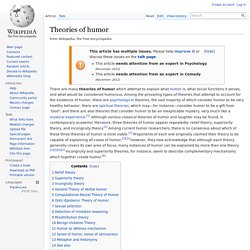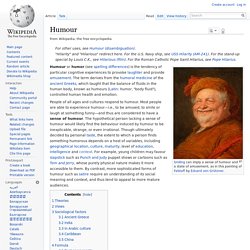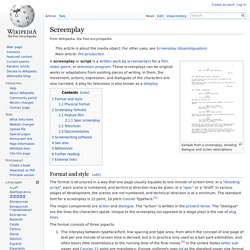

Category:Humour. Deadpan. Deadpan is an adjective, describing a deliberately emotionless or impassive, matter-of-fact manner.

It is also a form of comic delivery in which humor is presented without a change in emotion or body language. Theories of humor. Relief theory[edit] Relief theory maintains that laughter is a homeostatic mechanism by which psychological tension is reduced.[2][3][7] Humor may thus for example serve to facilitate relief of the tension caused by one's fears.[8] Laughter and mirth, according to relief theory, result from this release of nervous energy.[2] Humor, according to relief theory, is used mainly to overcome sociocultural inhibitions and reveal suppressed desires.

It is believed that this is the reason we laugh whilst being tickled, due to a buildup of tension as the tickler "strikes".[2][9] Superiority theory[edit] Incongruity theory[edit] The incongruity theory states that humor is perceived at the moment of realization of incongruity between a concept involved in a certain situation and the real objects thought to be in some relation to the concept.[10] The first formulation of the incongruity theory is attributed to the Scottish poet Beattie.[14] Humour. Humour or humor (see spelling differences) is the tendency of particular cognitive experiences to provoke laughter and provide amusement.

The term derives from the humoral medicine of the ancient Greeks, which taught that the balance of fluids in the human body, known as humours (Latin: humor, "body fluid"), controlled human health and emotion. §Theories[edit] An April fool in Denmark, regarding Copenhagen's new subway. Some claim that humour cannot or should not be explained. Postcard from France, early 20th century. Funny faces made with shells, painting made by Jan van Kessel the Elder (1626–1679) Many theories exist about what humour is and what social function it serves.
The benign-violation theory, endorsed by Peter McGraw, attempts to explain humours' existence. Others believe that 'the appropriate use of humor can facilitate social interactions"[3] §Views[edit] Some claim that humour cannot or should not be explained. §Sociological factors[edit] §Ancient Greece[edit] Fabula and syuzhet. Fabula and syuzhet (also sjuzhet, sujet, sjužet, or suzet (сюжет)) are terms originating in Russian Formalism and employed in narratology that describe narrative construction.

Syuzhet is an employment of narrative and fabula is the chronological order of the events contained in the story. They were first used in this sense by Vladimir Propp and Viktor Shklovsky. Screenplay. Main article: Pre-production Sample from a screenplay, showing dialogue and action descriptions A screenplay or script is a written work by screenwriters for a film, video game, or television program.

These screenplays can be original works or adaptations from existing pieces of writing. Cinema of Asia. Asian cinema refers to the film industries and films produced in the continent of Asia, and is also sometimes known as Eastern cinema.

More commonly, however, it is most often used to refer to the cinema of Eastern, Southeastern and Southern Asia. West Asian cinema is sometimes classified as part of Middle Eastern cinema, along with the cinema of Egypt. The Write Environment. The Write Environment From Wikipedia, the free encyclopedia Jump to: navigation, search The Write Environment is a documentary series hosted by Jeffrey Berman.

It is produced by Amy Gollnick; the executive producer is Jeffrey Berman. Dennis Potter. Dennis Christopher George Potter (17 May 1935 – 7 June 1994) was an English television dramatist, screenwriter and journalist.

His work in television drama began with contributions to BBC television's The Wednesday Play anthology series from 1965, and continued for the next thirty years. His BBC TV serial The Singing Detective (1986) was particularly well received.[1] This work and many of his television dramas mixed fantasy and reality, the personal and the social and often used themes and images from popular culture. A sufferer from psoriatic arthropathy for most of his adult life, Potter made regular public pronouncements on issues dear to him. Early life[edit] Dennis Potter was born in Berry Hill, Forest of Dean, Gloucestershire.
In 1946, Potter passed the eleven-plus and attended Bell's Grammar School at Coleford. Early career[edit] Potter's first non-fiction work, The Glittering Coffin, was published by the Gollancz Press in 1960. Plot twist.